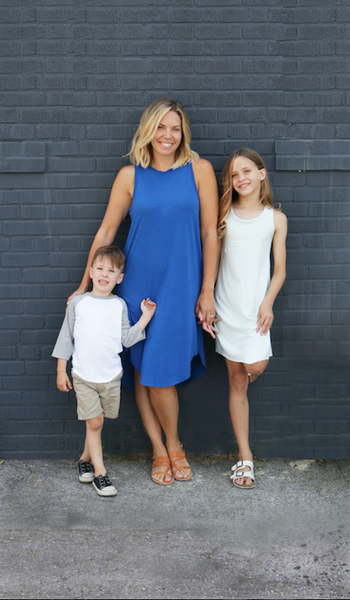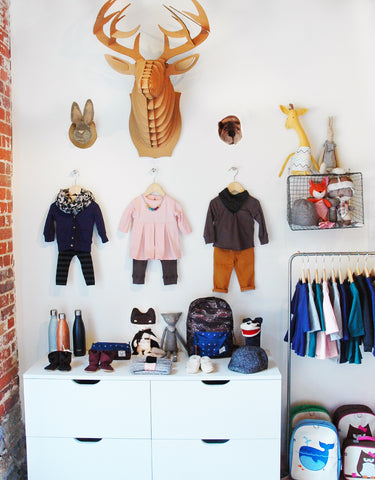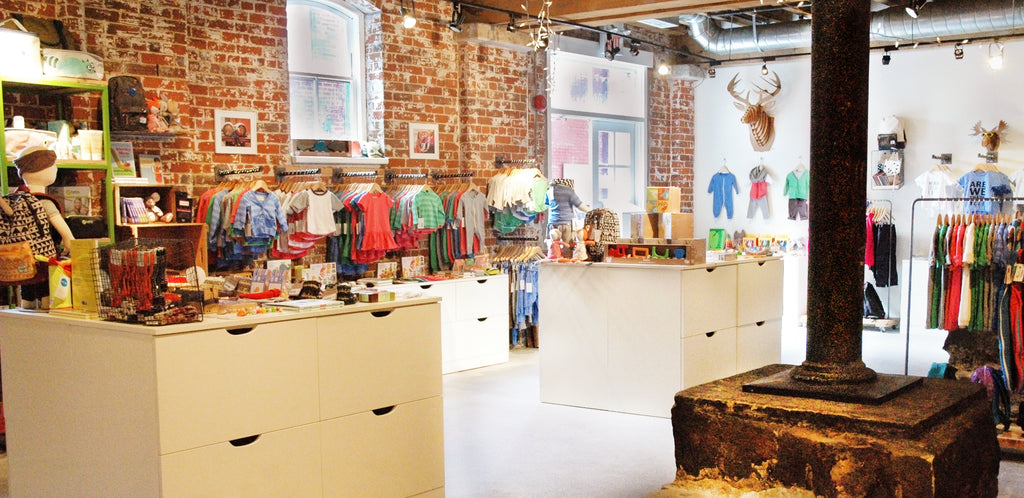It’s often said that dogs resemble their owners. While this is true of parents and their children for obvious reasons, parents are also dressing their offspring in attire that mirrors their own fashion sense. In the ’80s, it was Laura Ashley floral dresses for mothers and daughters. In 2016, many parents opt for minimalist basics in premium materials.
Capitalizing on this matchy-matchy inclination is Alyssa Kerbel, owner of Toronto, Canada-based children’s lifestyle brand Mini Mioche. After the birth of her first child eight years ago, Kerbel struggled to find neutral, wash-and-wear baby clothes without garish prints and in-your-face graphics.
“I’m a T-shirt and jeans kind of person and I just wanted to dress her in a similar way,” says Kerbel.
I think that’s the case with a lot of parents nowadays. They like their children to have a similar aesthetic and reflect their lifestyle.
With a background in fashion wholesaling, Kerbel decided to flex her creative muscles and start her own children’s clothing company. The brand has since evolved into two Toronto brick-and-mortar stores and an ecommerce site which attracts customers from across Canada.
After spending over a decade managing a fashion wholesale company in Toronto, Kerbel had collected the connections to get her business off the ground. Her first step was to hire a production manager to show her the ropes of clothing design, mockups, and manufacturing. Working together, Kerbel and her new manager decided to initially offer 10 basic styles in 10 colors for newborns up to 24 months to sell wholesale to children’s clothing boutiques.
Wholesale was the easiest way of doing business for clothing companies at the time, but it wasn’t the most profitable model. When Kerbel launched the brand, Canadian retailers had a minimal ecommerce presence. Kerbel was also concerned about entering the market for fear that her wholesale clients would consider her a direct competitor if she sold her wares online. Within about two years, Kerbel noticed that more and more Toronto brands were finding success with online sales, so she decided to give it a go in 2009.
“Within a year or two of offering wholesale, I started to see more and more companies offering an online, ecommerce component and I really want to do that too," she said. “It was just a more viable business model.”
As a result of popular demand for its stylish basics, Mini Mioche opened its first brick and mortar store on Toronto’s trendy Queen Street West in 2011 followed by a larger, 1,705-square-foot space east of the city in the Distillery District in 2013.
So, how did Kerbel, who self-funded her company, compete with big box stores like Baby Gap and fast fashion retailers like H&M?
The Lifestyle Factor

All Photos Courtesy of Mini Mioche
While there are certainly more stylish baby clothing options today than there were when Kerbel started her business, she carved out a niche for her company by becoming a lifestyle brand for children. This resonated with stylish parents who were looking for clothing as fashionable as their own wardrobes.
“It’s all about the aesthetic and the lifestyle and the image that they present not just for themselves, but for their kids,” Kerbel says. “The reality is that when people who are our target demographic have kids, they care more about how the kids look than how they look themselves.”
The Mini Mioche aesthetic is simple, cool, and comfortable. This translates to minimalist cotton hoodies in neutral colours, little grandpa-style cardigans made of a cotton jersey, sweet rompers, and subtle but playful printed tops and pants. The colors range from the classics like heather gray and navy to peach and periwinkle blue.
To further differentiate the brand and appeal to their ideal customer demographic, all their clothing is eco-friendly and made of organic cotton, meaning the materials are not treated with any harsh chemicals or pesticides.
The lifestyle component of the brand proved so popular that Mini Mioche expanded its offerings to include gear, accessories, toys and books, and skincare. As with everything at Mini Mioche, all products are highly curated and edited. Expect to see trendy name brands like Herschel Supply Co. and S’well water bottles and hard-to-find brands such as the organic-focused Matter Company skincare, along with artful blankets and prints for home.
“It is really a full lifestyle brand. Now we are starting to get into decor and other things like that because people are wanting it and they are buying it,” says Kerbel.
It’s all going back to that specific cool, simple aesthetic and lifestyle, but curated to kids and babies.
To reflect Kerbel’s goal of creating a truly curated lifestyle brand, each brick-and-mortar store is expertly laid out as to not overwhelm the customer. Rather than adding new clothing to its existing offerings, visual merchandising displays and stock are regularly switched out to make room for new apparel. Kerbel has been mindful of creating a clean and minimal environment free of clutter. This aesthetic is also a major differentiating factor from big box stores. Walking into Baby Gap or the kids section of Walmart, moms could easily feel overwhelmed by the racks upon racks of items. Whereas at Mini Mioche, one might feel like they have entered a luxe gallery setting.
“In the stores, it’s like the more product you add, the junkier it can look,” says Kerbel.
Exclusive Brands and Partnerships

What is cooler than dressing yourself and your baby in matching Adidas Stan Smith sneakers? Not much, according to Kerbel. While Mini Mioche focuses primarily on its clothing, a large secondary portion of its business comes from its range of shoes on offer.
“Our footwear is huge part of our business. We are very specific about how we buy and what we buy. It’s not super cutesy, it’s fashion footwear taken from brands that we would wear as adults that do kids collections. We are one of the only companies who offers a lot of selection of those types of brands without the other not so cool brands mixed in,” says Kerbel.
In addition to its too-cool-for-school kicks, which include brands such as Emu, Converse, New Balance, Aigle, and Native, Mini Mioche has also partnered with celebrated local brand Peace Collective. She also offered the well-known “Toronto Vs. Everybody” T-shirts, which quickly sold out. Additionally, the numerous posts using “liveinminimioche” is a masterclass on how to hashtag on Instagram.
The successful brand partnership prompted Kerbel to launch a new sub-brand called Brockton Basics which targets graphic-driven adult brands looking to print their designs on kids wear. Launched online in mid-August this year, Brockton Basics sells a range of blanks in the organic cotton in neutral colours that Mini Mioche is known for. It will continue as a online side project to Mini Mioche and has already been successful, with multiple online orders placed.
The Made-in-Canada Movement
The largest differentiating factor for Mini Mioche from big-box stores is that it’s made in Canada. It’s the aspect of the business that was most important to Kerbel, who didn’t like the idea of not knowing where her clothes are made or under which conditions they were being produced.
“I really wanted to do it locally and support local manufacturing. I feel like it’s doable to do it here."
People told me I was crazy and that there was no way I would be able to make money manufacturing the clothing locally.
Kerbel admits that if she hadn’t of switched from a wholesale model to retailing online and in store that the business likely wouldn’t have been profitable.
“The reality is we don’t make as much money on the stuff we produce and we are good with that. We don’t need to be making it in an environment that is way cheaper but in an unsafe environment that was harmful to people.”
Other than being able to sleep at night, manufacturing the clothing in Toronto also has its perks. Mini Mioche clothing frequently sells out, and since the factory is nearby, it’s possible to have the items re-cut and produced in three weeks versus the typical three months when dealing with foreign wholesalers.
“Our clothing is designed by us [and] manufactured by us, it’s organic, eco-friendly, and made in Canada. We are one of the only companies in North America and really in the world that does a full fashion basics collection that is ethically made and eco-friendly.”
Social Media Marketing = Sales
Social media has been the biggest driver for getting the word out about Mini Mioche.
Social media is the main way that we get business, 100%.
Instagram, followed by Pinterest and Facebook, are the main platforms driving consumers to the Mini Mioche website. The brand boasts 24.5K followers on Instagram. A recent post of a cherubic-faced little blond boy sporting a classic blue and white stripped shirt had the item selling out in a week. The image captured 243 likes and questions about re-stocking in the comments section.
“When we post things on social media we often sell out of it in a day or two — it’s an immediate response. People are sharing it and then it is that word of mouth through social media. And it’s very cost effective. It is by far the best way for us to get new customers and drive traffic.”
Social media is reaching target consumers across the country, which has had a positive impact on online sales. While Ontario still holds the top spot for sales, British Columbia ranks second with Quebec and Alberta closely following.
The High-Touch Approach
Kerbel attributes her success to hard work, sweat, and tears — and a high-touch, personal approach, whether its in-store or online.
The modern mom prefers online shopping, but generally speaking people still like to have an in-store experience initially.
"We have tons of customers who would shop at the Distillery or Queen, get to know it, and then love it. Once the know how it fits and how it washes, they don’t really need to go to the store.”
Kerbel has successfully translated the high-touch approach to online with the launch of a new website. Some of the features include an option for gift wrapping and personal, handwritten notes for shoppers looking to send baby gifts. The personalized touches extend all the way to Kerbel’s inbox, where she frequently responds to customer enquiries herself.
“I had a customer the other day who emailed asking if we used formaldehyde or bleach or any of those kind of chemicals in our clothes because her baby has eczema. I told her no, we don’t use any of those. Then I emailed my friend who had a baby boy who had eczema and she wrote me this whole email back with her recommendations and I sent that all on to the customer,” Kerbel says. “That’s a customer for life! She responded and was like, ‘OMG, I am going to tell everyone I know about this company!’”
The Future for Mini Mioche
 The future for Mini Mioche is primarily digital. With 40% of its sales coming from online, 35 per cent from its Queen location, and 25 per cent from the Distillery store, Kerbel is eager to grow her online business. Her physical shops will continue to complement her digital strategy and sales.
The future for Mini Mioche is primarily digital. With 40% of its sales coming from online, 35 per cent from its Queen location, and 25 per cent from the Distillery store, Kerbel is eager to grow her online business. Her physical shops will continue to complement her digital strategy and sales.
“Our customers spend more money online. They shop more online and tend to want to get the free shipping, which is $100 in Canada and $150 in the U.S. Most people who shop online will get to that 100 dollar mark.”
She plans to do grow her ecommerce business through social media, which will be targeted at getting the word out there and reaching consumers predominantly in the U.S. and internationally.
Back in Canada, the plan is to continue to reach consumers digitally and eventually to test markets outside of Toronto through pop-up-shops. With the long-term costs of brick-and-mortar stores being high, Kerbel will rely on pop-up-shops to determine the viability of another physical store. Based on online sales, the first location for such an activation will be Vancouver, since British Columbia ranks second behind Ontario in online sales.
“Our ecommerce has basically in the past four years more than doubled every year. It does significantly more business than our retail stores and it definitely has the most opportunity for growth,” says Kerbel.
The numbers are clear. The modern mom is an online shopper who cares about the clothing she puts on her children. With accelerated success since opening, Mini Mioche is bound to be on mini people around the world in no time.
Read more
- Early to Market: How Curiosity Helped This 3D Printing Service Find Success
- How The Rugged Society Simplified its Inventory Management with Shopify POS
- How Two Fashion Designers Used a Pop-Up Shop to Build Their Brand and Better Understand Their Customers
- How Il Conte Improved its Inventory Management with Shopify POS
- How This Outdoor Gear Brand Uses Content and Customer Feedback to Build Loyalty
- How Selling Cookies Online Was a Recipe For Success For This Healthy Baker
- How One Design Duo Went From Kickstarter Campaigns to a Successful Pop-Up Shop
- How a San Francisco Indie Wine Store is Attracting International Customers
- Selling Anywhere: How These Retailers Built a Community With Multichannel Sales





